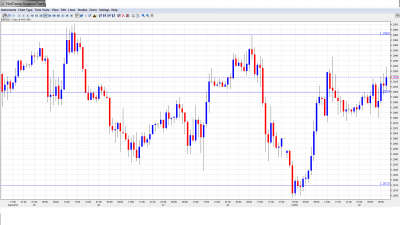EUR/USD is steady, but remains under pressure as the markets are unclear whether Spain will request a bailout. Meanwhile, Spanish unemployment claims hit a seven-month high, and Moody’s is expected to announce its rating review for the country. There are only three releases today, but things promise to be busier on Wednesday, with a host of European PMIs as well as key employment and manufacturing data out of the US.
Here’s an update about technical lines, fundamental indicators and sentiment regarding EUR/USD.
EUR/USD Technical
- Asian session: Euro/dollar traded close to 1.29. The pair has edged upwards in the European session.
- Current range: 1.2900 to 1.2960.
Further levels in both directions:
- Below: 1.2900, 1.2814, 1.2750, 1.2670, 1.2624, 1.2587, 1.2520 and 1.2460.
- Above: 1.2960, 1.30, 1.3060, 1.3105, 1.32, 1.3290, 1.34, 1.3437, 1.3480 and 1.3540.
- 1.29 is providing weak support after the pair pushed above this line.
- 1.2960 is the next resistance line.
Euro/Dollar steady above 1.29 – click on the graph to enlarge.
EUR/USD Fundamentals
- 7:00 Spanish Unemployment Change. Actual +79.6.
- 9:00 Euro-zone PPI. Exp. 0.6%. Actual 0.9%.
- All Day US Total Vehicle Sales. Exp. 14.4M.
EUR/USD Sentiment
- Spanish bailout saga continues: After unveiling its austerity budget, the Spanish government is hoping that a bailout can be avoided. The budget did help Spanish yields fall, and last week’s bank stress tests showed that the funding needs would be 59.3 billion euros in an adverse scenario – not really that bad. The problem is the lack of trust. Spain might have to find money for the banks on its own, after finance ministers from Germany, the Netherlands and Finland declared that bank supervision and bank bailout would only come for new banking problems and not for legacy ones. Thus, the agreements in the June 2012 EU Summit regarding a banking bailout for Spain seem null and void. Breaking the link between sovereigns and banks was a key value less than 3 months ago, and now it is gone. Although Germany doesn’t want to see another bailout, market sentiment is that Spain will indeed come with hat in hand, perhaps as early as next week.
- Spanish separatism on the rise: After setting a date for elections (Nov. 25th), the northeastern region of Spain passed a motion for independence. This was met with anger by the central government and raised bad memories from the past. With the economic situation deteriorating, both sides find it hard to find a compromise. And now, also the Basque Country sees more calls for independence, despite enjoying a more favorable economic model.
- Euro-zone likely in recession: Persistently weak employment and PMI data out of the Euro-zone has convinced many analysts that the zone was in a recession in Q3. Unemployment rates in Greece and Spain are practically off the charts, and the Euro-zone hit a record 11.4% earlier this week. PMIs throughout the zone are mostly below the 50.0 point level, indicating contraction in much, if not most, of sectors of the economy. With no sign of improvement on the horizon, speculation is increasing that the ECB will have to take drastic action and may slash interest rates to a record low of 0.5% before the end of the year.
- Greece seeks extension for repayments: Germany’s opposition leader and former finance minister called for giving more time to Greece. Will this impact Greece’s creditors? With the troika showing some flexibility over Greek repayments, there is hope for some good news, which will later require the approval of coalition partners. Talks about a third bailout program became more loud in recent days, as Greece is nowhere close to meeting targets. There are news reports out of Greece that the sides are further apart than they are saying publicly, and that the IMF is unhappy providing more funds to Greece at this point in time. A meeting of European finance ministers is set for October 8th, and could be seen as a deadline to accelerate the talks. Meanwhile, Greece released a draft budget for 2013, and the economic picture is anything but rosy. The economy is expected to shrink by 3.8%, and unemployment is forecast to remain above 24%.
- Spanish separatism grows: After setting a date for elections (Nov. 25th), the northeastern region of Spain passed a motion for independence. This was met with anger by the central government and raised bad memories from the past. With the economic situation deteriorating, both sides find it hard to find a compromise. And now, also the Basque Country sees more calls for independence, despite enjoying a more favorable economic model.
- US Economy – Direction Unknown: The downwards revision of Q2 GDP was quite depressing and showed that the US economy is at stall speed. However, improvement from housing and a surprising drop in jobless claims are positive points. The PMIs and ADP’s report build up the expectations towards the all important Non-Farm Payrolls on Friday.

